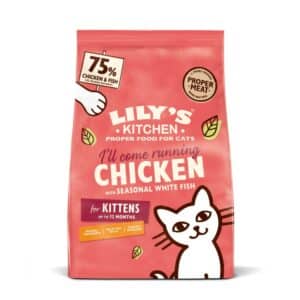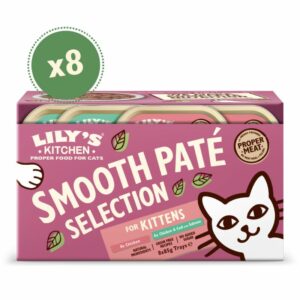
Feeding Your Kitten
Your kitten’s diet is essential to help support their growth and development and build a healthy immune system. Here you’ll find our top tips on feeding your kitten – their needs, choosing the right food and giving your little fluffball all the nutrients they need to grow into a healthy, happy cat.
Your Kitten’s Needs
Kittens need to be fed a complete diet that has been specially formulated for growth, so it’s important to choose a diet that is labeled as being ‘for kittens’. As well as what you are feeding your kitten, you also need to consider how much to feed your kitten every day, to help them maintain a healthy weight. Weigh your kitten regularly to make sure they are putting on weight gradually, and in a controlled manner. From weaning, kittens will still need several small meals throughout the day, as they have smaller stomachs and higher metabolism than adults.
Go Grain Free
Cats wouldn’t consume carbohydrates such as rice or wheat as part of their natural diet. That’s because cats haven’t naturally evolved to digest or make use of carbohydrates very well.
Cats don’t produce salivary amylase, (an enzyme that breaks down starch), and show no taste preference towards sugary foods like carbohydrates.
Many dry kitten foods contain a high proportion of carbohydrate because the manufacturing process requires starch to help the kibble stick together – it acts rather like a glue.
Grain free dry kitten foods are often produced in a more natural way so no grains are needed at all. Instead, the source of energy in our food comes from protein and good fats – which is much better for your kitten. This is how we make our food here at Lily’s Kitchen.
Should I Feed My Kitten Wet Food Or Dry Food?
Every kitten has their own preferences when it comes to food and their taste for the flavours and texture they prefer are formed in kittenhood.
Here at Lily’s Kitchen we think it’s important for the majority of a kitten’s diet to be in the form of wet food.
Wet food contains more water so it helps to keep cats – who naturally have a low thirst drive – well hydrated.
A wet diet helps to make sure your cat has a good daily water intake which is important for maintaining a healthy urinary tract system, looking after long-term kidney health.
Mix Up The Menu
Cats’ food preferences are established early in life. So, by offering your kitten a mixture of wet and dry food in a range of different flavours, you’ll be broadening their adult palate. Hopefully this means they’ll be less likely to be fussy later on, and accept a wide variety of food types.
-
Sale!

Lily’s Kitchen Chicken with White Fish Complete Dry Kitten Food
This complete dry food Kitten Recipe is full of all the nutrients your kitten ne...
€12.79 – €14.99 -

Lily’s Kitchen Smooth Paté Selection Complete Kitten Food (8x85g)
Kittens. They go wild for our patés. So instead of serving up the same supper n...
€9.95
No Milk Please
After weaning most cats are lactose intolerant and can no longer digest milk properly. This means that although cats do love milk, it usually gives them an upset tummy and can cause diarrhoea. If you are keen to offer your cat milk for a treat, choose special lactose free ‘cat milk’ from the pet shop (but remember that this is high in calories and so not a healthy choice for frequent feeding).
Making Changes To Their Diet
Always make any dietary changes gradually. Sudden changes to the diet can cause tummy upsets. So, if you are either changing to a diferent recipe or changing to a new food, do so gradually over at least 4-5 days.

The Best Start For Your Kitten
Lily’s Kitchen Curious Kitten recipes have been specially created for the growing kitten. These recipes have higher levels of protein and calcium to support healthy growth, and prebiotics to support digestive health.
Our food for kittens contains chelated minerals to ensure kittens get the most from the nutrients, salmon oil to help maintain a glossy coat, and seaweed, which contains a vast range of micro-nutrients to promote good health.
